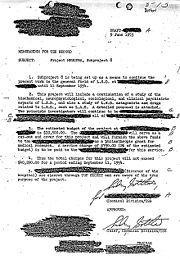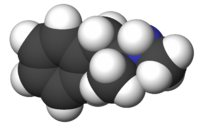
Psychochemical weapons
Encyclopedia

Less-lethal weapon
Non-lethal weapons, also called less-lethal weapons, less-than-lethal weapons, non-deadly weapons, compliance weapons, or pain-inducing weapons are weapons intended to be less likely to kill a living target than are conventional weapons...
.
Cold WarCold WarThe Cold War was the continuing state from roughly 1946 to 1991 of political conflict, military tension, proxy wars, and economic competition between the Communist World—primarily the Soviet Union and its satellite states and allies—and the powers of the Western world, primarily the United States...
suspicions
In the early 1950s Western experts were convinced that the communists had already developed and used highly effective mind controlMind control
Mind control refers to a process in which a group or individual "systematically uses unethically manipulative methods to persuade others to conform to the wishes of the manipulator, often to the detriment of the person being manipulated"...
and behavior-modification drugs. Public testimonies of US prisoners of war in Korea, or that of Cardinal Mindszenty of Hungary admitting to unrealistic crimes in fabricated trials appeared to support this conclusion. And indeed, decades later Mindszenty mentioned pills that got him to make a confession. Therefore, the CIA launched a project called MKULTRA to counter perceived Soviet and Chinese advances in brainwashing methods. A new branch of science, neuropharmacology
Neuropharmacology
Neuropharmacology is the study of how drugs affect cellular function in the nervous system. There are two main branches of neuropharmacology: behavioral and molecular. Behavioral neuropharmacology focuses on the study of how drugs affect human behavior , including the study of how drug dependence...
, emerged in parallel with its immediate political and military use. The US and Britain
United Kingdom
The United Kingdom of Great Britain and Northern IrelandIn the United Kingdom and Dependencies, other languages have been officially recognised as legitimate autochthonous languages under the European Charter for Regional or Minority Languages...
were secretly working on the weaponization of LSD
LSD
Lysergic acid diethylamide, abbreviated LSD or LSD-25, also known as lysergide and colloquially as acid, is a semisynthetic psychedelic drug of the ergoline family, well known for its psychological effects which can include altered thinking processes, closed and open eye visuals, synaesthesia, an...
(lysergic acid diethylamide) and BZ (3-quinuclidinyl benzilate
3-Quinuclidinyl benzilate
3-quinuclidinyl benzilate , IUPAC name 1-azabicyclo[2.2.2]Oct-3-yl α-hydroxy-α-phenylbenzeneacetate, is an odorless military incapacitating agent. Its NATO code is BZ...
) as nonlethal battlefield drug-weapons to develop psychochemicals for mind control in the battlefield.
However, evidence supporting the suspicions against communist regimes was scarce, and MKULTRA evolved into an offensive program. When accidentally uncovered, it involved about 150 research projects. The project was revealed by the US congressional Rockefeller Commission report
United States President's Commission on CIA activities within the United States
The U.S. President's Commission on CIA activities within the United States was set up under President Gerald Ford in 1975 to investigate the activities of the Central Intelligence Agency and other intelligence agencies within the United States...
. Details are not well understood since its records were deliberately destroyed. The British also concluded that the desired effects of drug weapons were unpredictable under battlefield conditions and gave up experimentation. Many experts in the East and the West equally suggested that drug weapon stories associated with the Soviet bloc were unreliable hints given the apparent absence of documentation in state archives.
Dissidents from the Soviet Bloc
General Jan SejnaJan Sejna
Jan Šejna , also Sejna in English, was, in the time of communist Czechoslovakia, a Major General of the Czechoslovak Army. After losing political power and influence at the beginning of the Prague Spring, he sought refuge in the U.S. consulate in Trieste and defected to the United States...
defected to the United States during the Prague Spring
Prague Spring
The Prague Spring was a period of political liberalization in Czechoslovakia during the era of its domination by the Soviet Union after World War II...
of 1968 after being accused of corruption by the reformist government of Alexander Dubček
Alexander Dubcek
Alexander Dubček , also known as Dikita, was a Slovak politician and briefly leader of Czechoslovakia , famous for his attempt to reform the communist regime during the Prague Spring...
. Formerly, he had been a leading hardline supporter of the Stalinist President of Czechoslovakia Antonín Novotný
Antonín Novotný
Antonín Novotný was General Secretary of the Communist Party of Czechoslovakia from 1953 to 1968, and also held the post of President of Czechoslovakia from 1957 to 1968. He was born in Letňany, now part of Prague....
and the head of the Defense Council Secretariat and Chief of Staff to the Minister of Defense in Czechoslovakia
Czechoslovakia
Czechoslovakia or Czecho-Slovakia was a sovereign state in Central Europe which existed from October 1918, when it declared its independence from the Austro-Hungarian Empire, until 1992...
. He claimed to have been involved in planning and monitoring Czechoslovakia's participation in drug warfare programs from 1956. He noted there had been two programs. The program code-named Peoples' Friendship aimed at large-scale drug trafficking with the goal to harm western societies at their own expenses. Another program, code-named Flute was targeting the political and religious opponents within the homeland.
A decade later, Lieutenant General Ion Mihai Pacepa
Ion Mihai Pacepa
Ion Mihai Pacepa is the highest-ranking intelligence official ever to have defected from the former Eastern Bloc. He is now a United States citizen, a writer, and a columnist....
defected to the US. Ha had been the head of the Securitate
Securitate
The Securitate was the secret police agency of Communist Romania. Previously, the Romanian secret police was called Siguranţa Statului. Founded on August 30, 1948, with help from the Soviet NKVD, the Securitate was abolished in December 1989, shortly after President Nicolae Ceaușescu was...
(the secret police of communist Romania
Romania
Romania is a country located at the crossroads of Central and Southeastern Europe, on the Lower Danube, within and outside the Carpathian arch, bordering on the Black Sea...
)—the highest-ranked intelligence officer ever to defect from the communist era. He also mentioned these two types of drug misuses partially in collaboration with Cuba
Cuba
The Republic of Cuba is an island nation in the Caribbean. The nation of Cuba consists of the main island of Cuba, the Isla de la Juventud, and several archipelagos. Havana is the largest city in Cuba and the country's capital. Santiago de Cuba is the second largest city...
.
Finally, Kanatjan Alibekov (aka Ken Alibek), the 1st Deputy Chief of the Soviet Union's (later Russia's) illegal bioweapons program, defected in 1992. He mentions the project code-named Flute in his memoirs as a major project aimed to develop psychotropic and behavior-modification drugs. He claims that this development took the form of a large-scale project pursued in major psychiatry clinics of Moscow
Moscow
Moscow is the capital, the most populous city, and the most populous federal subject of Russia. The city is a major political, economic, cultural, scientific, religious, financial, educational, and transportation centre of Russia and the continent...
.
These three defectors were knowledgeable high-ranked officers; however after their defections they earned money by selling their stories. This gave rise to skepticism about the reliability of their claims. Independent reports of former target persons verify the widespread misuse of psychoactive drugs in the psychiatry clinics of the Warsaw Pact. However, they refer to drug misuse in a medical sense, while direct military aspects were not known up to recently. Thus, contrary to widespread rumors, there was little, if any, evidence to support the view that the Soviet Union or its satellite states considered drug weapons in a military context.
Recent findings from the former Soviet Bloc

Hungary
Hungary , officially the Republic of Hungary , is a landlocked country in Central Europe. It is situated in the Carpathian Basin and is bordered by Slovakia to the north, Ukraine and Romania to the east, Serbia and Croatia to the south, Slovenia to the southwest and Austria to the west. The...
's State Defense Council meetings (1962–78). These include documents describing the coordinative meetings of the Warsaw Pact military medical services. Research into possible countermeasures against psychotropic drugs is listed as a research priority assigned to Hungary in 1962. Hungary rejected this task in 1963, but joined the ongoing project again in 1965. Methylamphetamine was produced in Budapest
Budapest
Budapest is the capital of Hungary. As the largest city of Hungary, it is the country's principal political, cultural, commercial, industrial, and transportation centre. In 2011, Budapest had 1,733,685 inhabitants, down from its 1989 peak of 2,113,645 due to suburbanization. The Budapest Commuter...
for use as an experimental model. Contemporary Western experts considered this drug as an interrogation tool, so-called truth-drug. Similarly to contemporary CIA, Hungary also failed to develop an antidote and the Hungarian project was terminated fruitlessly in 1972. In fact, these documents serve as evidence that a Warsaw Pact forum had considered a psychochemical agent as a possible weapon.
The Iraqi weapon
The existence of a BZ-related compound, called Agent-15, in IraqIraq
Iraq ; officially the Republic of Iraq is a country in Western Asia spanning most of the northwestern end of the Zagros mountain range, the eastern part of the Syrian Desert and the northern part of the Arabian Desert....
's arsenals was revealed in 1998. Apparently, Iraq possessed large quantities of the agent since the 1980s. A document found by the United Nations Special Commission
United Nations Special Commission
United Nations Special Commission was an inspection regime created by the United Nations to ensure Iraq's compliance with policies concerning Iraqi production and use of weapons of mass destruction after the Gulf War...
(UNSCOM) in 1995 contained a brief reference to this agent and subsequent assessment of relevant scientific and other background material indicated the size of the stockpile. Soldiers of 3rd Infantry Division, Fort Stewart Georgia found facilities used for the production of these weapons. The facilities had been closed for several years before the invasion as dust almost a half inch thick was noted on everything. Records books of personnel who had entered the buildings and other project related equipment looked as though everything had been stopped suddenly and it did not appear that the research had ever progressed to a state of actual production.
Moscow hostage crisis
In October 2002, Russian SpetsnazSpetsnaz
Spetsnaz, Specnaz tr: Voyska specialnogo naznacheniya; ) is an umbrella term for any special forces in Russian, literally "force of special purpose"...
(special forces) pumped a gas into a theater being held by Chechen rebels, subduing them, but also causing fatalities among the hostages.
Adapting pharmaceuticals
British researcher Malcolm Dando has warned of the potential for military adaptation of legal pharmaceuticals to military purposes. He has called for the strengthening of the Chemical Weapons ConventionChemical Weapons Convention
The Chemical Weapons Convention is an arms control agreement which outlaws the production, stockpiling and use of chemical weapons. Its full name is the Convention on the Prohibition of the Development, Production, Stockpiling and Use of Chemical Weapons and on their Destruction...
to outlaw this technique.
See also
- Biological weapon
- Chemical weapon
- Punitive psychiatry in the Soviet Union
- BerserkerBerserkerBerserkers were Norse warriors who are reported in the Old Norse literature to have fought in a nearly uncontrollable, trance-like fury, a characteristic which later gave rise to the English word berserk. Berserkers are attested in numerous Old Norse sources...
s - possibly consumed Amanita muscariaAmanita muscariaAmanita muscaria, commonly known as the fly agaric or fly amanita , is a poisonous and psychoactive basidiomycete fungus, one of many in the genus Amanita...
before battle

